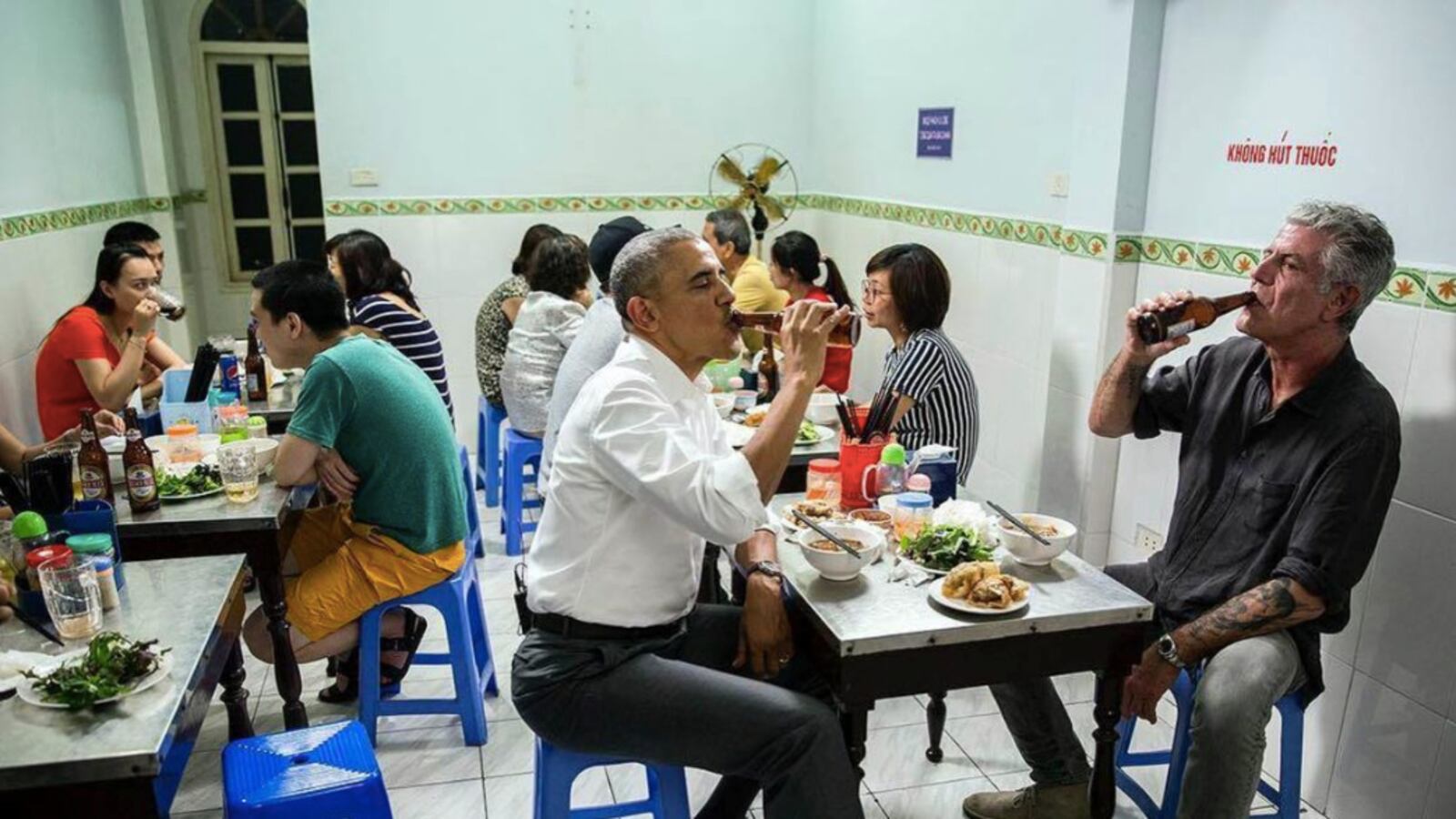President Barack Obama has fulfilled a lot of Americans’ pop culture fantasies over the past eight years. Dancing with Ellen. Driving with Jerry. Hunting with Bear. Now, he can add one more to his presidential bucket list: Traveling with Tony.
The eighth season premiere of Anthony Bourdain: Parts Unknown, airing this Sunday night, September 25 at 9 p.m. ET on CNN, finds Obama sitting down with the legendary world-traveling foodie in Hanoi, Vietnam, for some bowls of bun cha. The meeting of minds actually occurred back in May during Obama’s trip to Southeast Asia and, as Bourdain tweeted at the time, the meal cost just $6.
Bourdain, who has called his first trip to Vietnam “life-changing,” opens the episode with a quote from Graham Greene’s The Quiet American: “They say whatever you’re looking for, you will find here… The smell: that’s the first thing that hits you, promising everything in exchange for your soul.” For the host, that smell is a combination of motorbike exhaust and grilled meat. “Once you love it, you love it forever,” he says of the country.
President Obama, who waited until his final year in office to make his first trip to Vietnam, was “taking another step on the long path toward normalizing relations between the two countries,” as Bourdain says early in the show, pointing out that the people there call what we know as the Vietnam War, the “American War.”
The Obama appearance doesn’t come until more than halfway through the episode. It’s a typically rain-soaked day in Hanoi—“Just another day in paradise,” Bourdain quips. In a “working-class neighborhood on the outskirts” of the city, Bourdain gets patted down by Secret Service before authorities wave the presidential motorcade into the square. Obama gets out of “The Beast,” holding a black umbrella and waving to the bewildered-looking people lining the street. “I love you, Obama!” one man yells.
The president tells Bourdain that the markets remind him of those he grew up visiting in Jakarta, Indonesia. “You would buy pretty much everything in stalls like this,” Obama says. “I wouldn’t mind going there, haggling, and seeing what I can find.”
One of the most remarkable things about the meal the two men share—besides its remarkably low cost—is that barely anyone in the packed hole-in-the-wall restaurant seems to even recognize the president, let alone Bourdain. As they clink Vietnamese beers, Obama tells Bourdain that he doesn’t get to “sneak out for a beer” anymore but occasionally does get to take the first lady for a date night. But they always end up in a private room to avoid gawking onlookers.
“It takes some skills, by the way, to handle these sticky, cold noodles,” Bourdain says in voiceover as Obama puts together his first bite of the delicious-looking soup, hot chiles included. “But whatever your opinion of the man, the president has those skills.” The pair reminisce about some of their favorite Southeast Asian meals and discuss the rules about ketchup on hot dogs (“not acceptable” after the age of eight, according to the Chicagoan.)
Even if not by name, the idea of Donald Trump inevitably comes up. “We seem to be at a point where we’re turning inwards, I mean we’re actually talking about building a wall around our country,” Bourdain says, commending Obama for his willingness to reach out to countries that don’t necessarily agree with America, such as Iran and Cuba. The host says he wishes more Americans could travel to the places he sees, an activity that would be “useful at worst and incredibly pleasurable and interesting at best.” Alas, we can’t all be Anthony Bourdain.
“It confirms the basic truth that people everywhere are pretty much the same,” Obama agrees. “The same hopes and dreams.” When he sees people like John Kerry or John McCain returning to Vietnam to “make peace” with their pasts in the country, the president said he is hopeful about the future of the world. “Progress is not a straight line, there’s going to be moments in any given part of the world where things are terrible,” he added. “But, having said all that, I think things are going to work out.”
Maybe it’s false idealism or wishful thinking, but it’s the kind of positive message that is too often missing from our hyper-politicized rhetoric these days.






